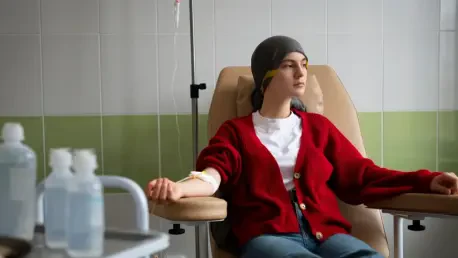In the dynamic world of modern medicine, expectations run high for treatments that are not only effective but also minimize risks. Yet, conventional cancer therapies often walk a fine line between disease eradication and severe side effects. What if there was a way to tailor treatments to each patient’s genetic makeup, enhancing both safety and efficacy?
Pharmacogenomics, a burgeoning field that examines how genes affect a person’s response to drugs, holds promise in transforming cancer treatment. Traditional approaches sometimes result in life-threatening side effects due to genetic variations, making the case for personalized medical strategies more compelling than ever. Pharmacogenomics, or PGx, aims to address this by tailoring treatments based on individual genetic profiles.
The Promise of Personalized Medicine
Imagine being able to predict adverse reactions to cancer drugs before they even occur. Conventional cancer treatments, despite their efficacy, often bring alarming challenges. Severe toxicities can result from one-size-fits-all approaches, jeopardizing patient well-being and complicating therapeutic regimens. This pressing issue underscores the need for individualized treatment options that reduce risks and optimize health outcomes.
Pharmacogenomics emerges as a revolutionary approach in this realm. By analyzing how genetic variability impacts drug responses, PGx allows healthcare providers to craft personalized treatment plans. This method promises to reduce the likelihood of adverse reactions significantly, representing a quantum leap toward safer and more effective cancer care.
The Importance of Pharmacogenomics
Pharmacogenomics serves a vital role in personalizing healthcare by discerning genetic predispositions to drug responses. This aspect of genomic medicine could profoundly alter the therapeutic landscape, especially in cancer treatment where adverse reactions can be severe and sometimes fatal. Conventional treatments, though broadly effective, fail to account for individual genetic differences, leading to varying patient experiences.
Understanding the urgency of addressing drug reactions in cancer therapies is crucial. With pharmacogenomics, clinicians can predict which patients are likely to suffer from severe side effects and adjust treatments proactively. This level of personalization not only enhances patient safety but also paves the way for more successful treatment outcomes.
The DPYD Gene and Chemotherapy Toxicity
The DPYD gene encodes the enzyme dihydropyrimidine dehydrogenase, essential for metabolizing drugs like fluorouracil and capecitabine used in chemotherapy. Variants in this gene can severely impede this metabolic process, causing toxic accumulation of these drugs in some patients. Such toxicity can lead to life-threatening conditions like neutropenia, severe gastrointestinal distress, and hand-foot syndrome, necessitating hospitalization and, in extreme cases, resulting in fatality.
Approximately three percent of the 275,000 cancer patients treated annually with fluorouracil in the U.S. experience some degree of toxic reaction, with roughly 1,300 of these cases resulting in death each year. Pre-treatment DPYD testing offers a strategy to identify at-risk patients, significantly reducing the incidence of severe toxicities and enhancing therapeutic outcomes.
Expert Perspectives and Research Findings
Oncologists and geneticists underscore the critical importance of pharmacogenomics in cancer treatment. According to Dr. Lorena Diaz, an oncologist, “Pre-treatment PGx testing can transform a patient’s cancer care journey by making it safer and more personalized.” Recent studies highlight the benefits of incorporating DPYD testing before administering chemotherapy, demonstrating significantly reduced rates of severe side effects.
Patient anecdotes further emphasize the significance of these tests. For instance, Sarah, a breast cancer survivor, recounts how pre-treatment DPYD testing identified her as high-risk, leading to adjusted dosages that spared her from debilitating side effects. Such real-world experiences underline the transformative potential of PGx testing in clinical practice.
Implementing Drug-Gene Testing in Clinical Practice
Adopting pharmacogenomics in daily clinical practice involves following established guidelines and integrating new protocols. The Clinical Pharmacogenetics Implementation Consortium (CPIC) provides comprehensive recommendations for applying DPYD test results in chemotherapy settings. CPIC advises dosage reductions or alternative treatments based on the degree of DPD deficiency identified.
In Europe, preemptive DPYD testing has become a recommended practice, reflecting a growing global consensus on its necessity. The FDA also acknowledges DPD deficiency risks, suggesting oncologists consider pre-treatment testing seriously. Implementing these guidelines into hospital protocols requires training, workflow adjustments, and collaboration with genetic testing providers to ensure seamless integration.
Broader Implications for Cancer Care
While DPYD testing represents a vital advancement, the broader potential of multi-gene PGx panels cannot be overlooked. These panels address various genetic factors impacting drug metabolism, offering a more extensive safety net and personalized care framework. Besides optimizing treatment efficacy, multi-gene testing demonstrates cost-effectiveness by preventing adverse reactions, thereby reducing overall healthcare costs.
Strategies to overcome challenges in routine testing involve establishing standardized procedures and ensuring equitable access across diverse populations. Integrating PGx testing into initial diagnostic processes and maintaining updated genetic databases are pivotal steps toward widespread adoption, promising a future where personalized medicine is the norm rather than the exception.
Conclusion
Enhancing cancer treatment safety through pharmacogenomics requires a concerted effort from the medical community, regulatory bodies, and healthcare providers. By promoting DPYD and diverse gene testing, hospitals and clinics can significantly mitigate adverse drug reactions, improving patient outcomes and treatment experiences. The journey toward personalized and safer cancer care, propelled by the insights of pharmacogenomics, is not just a possibility but a necessity, heralding a new era of medical precision.









